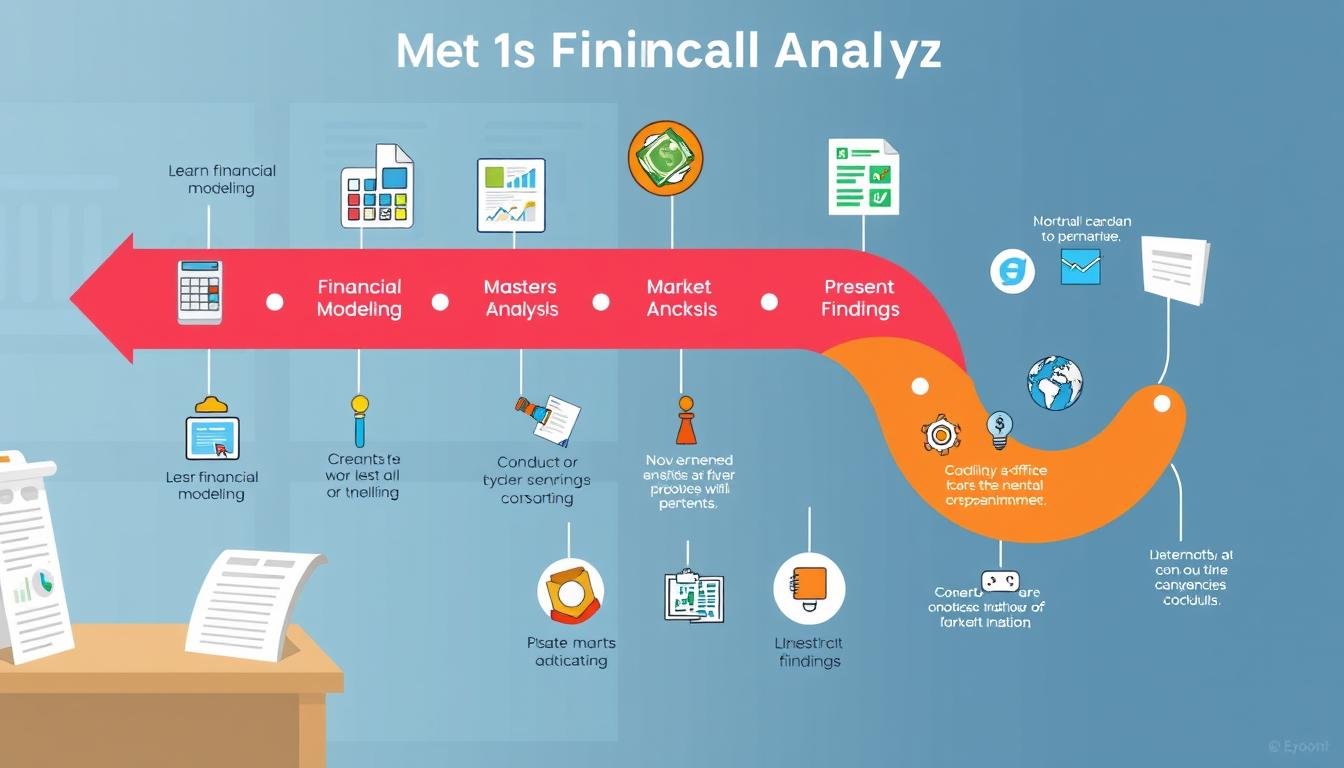The Ultimate Guide to Acing Your First Year as a Financial Analyst
Ever wondered why some entry-level financial analysts soar to success while others face challenges? This guide is here to help you navigate your finance career. We’ll cover key first-year tips, essential skills, and networking strategies. These will help you build a strong foundation for a successful career.
Key Takeaways
- Essential strategies for thriving as a new financial analyst.
- Adapting to industry demands and mastering vital skills.
- Developing a sustainable and productive work routine.
- Importance of building a professional network in finance.
- Realistic expectations and common misconceptions to avoid.
- Leveraging resources to excel in financial modeling and Excel.
- Balancing work and personal life to manage stress and avoid burnout.
Understanding the Role of a Financial Analyst
Financial analysts are key in any finance team. They help make big business decisions. They look at financial data, make forecasts, and create reports. These reports give important insights to others.
Daily Responsibilities and Tasks
Financial analysts do many important things every day. They:
- Analyze financial data to find trends and chances
- Make financial forecasts and models
- Prepare detailed financial reports for top managers
- Watch how finances are doing against plans and standards
- Work with other teams to get and check financial info
Key Skills Required
To do well, financial analysts need certain skills. These skills help them do their job well. Important skills include:
- Analytical Thinking: They can break down hard financial data and find useful info
- Proficiency in Financial Software: They know how to use tools like Excel and SAP
- Attention to Detail: They make sure their work is accurate and precise
- Communication Skills: They can explain complex financial info clearly
By using these skills and doing their job well, financial analysts are crucial for a finance team’s success.
Setting Realistic Expectations
Starting your career as a financial analyst means setting realistic expectations. It’s important to understand common misconceptions in finance. Also, developing effective work habits is key to success in this competitive field.
Common Misconceptions
Many new financial analysts have wrong ideas about their job. They think it’s all about making big deals and being famous. But, the truth is, entry-level jobs involve a lot of data work, reports, and models under tight deadlines.
Another myth is that you’ll make a lot of money right away. While finance jobs can pay well, you’ll start with a lower salary. You’ll need experience and skills to earn more.
| Misconception | Reality |
|---|---|
| Quick Climb to Top Positions | Gradual career growth with incremental promotions |
| Consistent Glamorous Tasks | Repetition of critical financial tasks |
| High Initial Salary | Competitive entry-level earnings with potential for growth |
Building a Sustainable Work Routine
Creating a good work routine is crucial for new analysts. Developing effective work habits boosts your productivity. It also helps you keep a balance between work and life, avoiding burnout.
Start by making daily to-do lists and using tools to manage your work. Talking to mentors and colleagues can give you great advice and support. These connections help you face challenges and grow in your career. Don’t forget to take breaks and enjoy hobbies to stay well.
Building a Strong Foundation in Financial Modeling
Understanding financial modeling is key for financial analysts. It helps make smart business choices and predict money matters. In today’s world, it’s more important than ever. It lets analysts show how a company’s money works, helping in making better plans.
Why Financial Modeling Matters
The financial modeling importance goes beyond just looking at money. It gives a big edge by showing what might happen in the future. Good models check if new ideas are worth it, use resources well, and manage risks. Knowing how to model money is key for both everyday work and big plans.
Resources for Learning Financial Modeling
Getting good at financial modeling needs the right financial analysis education. Here are some top picks for learning:
- Books: “Financial Modeling” by Simon Benninga and “Investment Valuation” by Aswath Damodaran are great places to start.
- Online Courses: Coursera and Udemy have top financial modeling training courses. “Financial Modeling and Valuation” is a top pick.
- Workshops: Workshops by places like the Corporate Finance Institute (CFI) give real practice and learning.
- Software: Tools like Microsoft Excel, Matlab, and SAS help make and test models. Learning these is crucial for financial analysts.
Using these resources, financial analysts can build a strong base. They can then move up in their careers by using financial modeling well.
Mastering Excel for Financial Analysis
Excel is key for financial analysts, helping with data handling and analysis. Learning Excel well is vital for those in financial analysis. It helps analysts work faster, make data more accurate, and make better decisions.
First, you need to get good at pivot tables. They help summarize big datasets, showing trends and patterns. With pivot tables, you can easily organize and analyze data without complicated formulas.
Knowing how to use the VLOOKUP function is also crucial. It lets you find data across different sheets, great for comparing or finding specific financial info. VLOOKUP is a must for managing data well.
Being skilled in macros also boosts your work. Macros do repetitive tasks, letting you spend more time on understanding data. Learning these skills makes your financial models accurate and efficient.
Here’s a table of the main Excel functions analysts should know:
| Function | Description |
|---|---|
| Pivot Tables | Summarizes large datasets, revealing patterns and trends. |
| VLOOKUP | Searches and retrieves data from various sheets for comparisons. |
| Macros | Automates repetitive tasks to save time and reduce errors. |
By learning these Excel skills, you’ll improve your spreadsheet skills. Mastering these functions makes handling complex financial data easier and more precise. It sets you up for success in financial analysis.
Effective Communication Skills
In the finance world, knowing how to communicate well is key. It’s not just about numbers; how you share financial info is just as important. We’ll look at how to write clear reports and present data in a way that grabs attention.
Writing Clear and Concise Reports
Good financial reporting is the foundation of finance communication. A report should be simple to get, even for those not in finance. Here’s what makes a report effective:
- Clarity: Speak clearly. Stay away from terms that confuse people.
- Conciseness: Be to the point but still cover all important details. Don’t make it too long.
- Precision: Make sure all numbers and facts are correct. This keeps your report trustworthy.
Presenting Data to Stakeholders
As a financial analyst, you’ll often share data with others. A good presentation can really sway decisions. Here are some tips to keep in mind:
- Visualization: Use pictures and graphs to show data clearly.
- Simplicity: Keep your slides simple. Focus on the most important points.
- Engagement: Make eye contact and talk to your audience. This keeps them interested.
| Mode | Advantages | Disadvantages |
|---|---|---|
| Reports | Detailed, can be referred to later | May not engage all stakeholders |
| Presentations | Engaging, facilitates real-time interaction | Requires strong speaking skills |
Navigating Corporate Finance and Investment Banking
Starting a career in finance means knowing the difference between corporate finance and investment banking. It’s important to pick the right path. This ensures your skills and goals match the job’s needs.
Differences Between Corporate Finance and Investment Banking
Corporate finance deals with a company’s money matters. This includes planning budgets and structuring capital. The goal is to increase the company’s value and reduce financial risks.
Investment banking, however, focuses on getting money for companies and governments. It involves talking to clients, helping with mergers, and advising on deals. Here’s a comparison of the two:
| Aspect | Corporate Finance | Investment Banking |
|---|---|---|
| Primary Focus | Maximizing a company’s value | Raising capital, M&A advisory |
| Work Environment | In-house, collaborative | High-paced, client-facing |
| Typical Activities | Budgeting, financial analysis, strategic planning | Underwriting, deal structuring, client consulting |
| Skills Required | Analytical, strategic thinking, risk management | Negotiation, market knowledge, high pressure resilience |
Choosing the Right Path for Your Career
Deciding between corporate finance and investment banking is key. Both offer great opportunities but suit different skills and goals.
Corporate finance is for those who like a structured, team-based setting. It focuses on improving a company’s financial health over time. It’s perfect for those who enjoy working on long-term projects.
Investment banking is for those who love fast-paced, client-focused work. It’s ideal for those who can handle stress well and are interested in big financial deals.
Your choice should match your work style, skills, and career goals. Knowing the differences between corporate finance and investment banking helps you make the right choice for your career.
The Ultimate Guide to Acing Your First Year as a Financial Analyst
Starting as a financial analyst can feel overwhelming. But, with the right steps, it can be a fulfilling journey. First, understand your role well. This includes tasks like data analysis, report making, and talking to stakeholders. Also, learning financial modeling is key to your success.
It’s important to have realistic goals. Don’t fall for common myths about finance jobs. For example, learning to manage your time well can prevent burnout. Also, mastering tools like Excel is crucial for financial analysis.
Good communication skills are essential. You need to write clear reports and present data well. As you learn more about finance and banking, choose the right path for your career. This choice can greatly impact your future.
Networking is vital. It helps you find mentors and get valuable advice. Join finance groups, go to conferences, and use LinkedIn to grow your network.
Improving continuously is important. Seek feedback, stay updated with trends, and learn new analytical techniques. Also, keep a good balance between work and life to grow in your career.
| Key Component | Description |
|---|---|
| Understanding the Role | Daily tasks, key skills, financial sector insights |
| Setting Realistic Expectations | Avoiding misconceptions, building sustainable routines |
| Building Foundation in Financial Modeling | Learning essential modeling skills and techniques |
| Mastering Essential Tools | Excel proficiency and practical applications |
| Effective Communication Skills | Writing reports, presenting data |
| Navigating Finance Paths | Differences and guidance on corporate finance vs. investment banking |
| Importance of Networking | Building relationships, leveraging platforms like LinkedIn |
| Continuous Improvement | Seeking feedback, learning advanced techniques, balancing work-life |
This guide offers key strategies for starting your finance career. By following these tips and always improving, you’re set for a great first year. This will lay the foundation for a successful career in finance.
Importance of Networking in Finance
Mastering finance networking is key for career growth in finance. Building strong professional relationships in finance can lead to new chances and valuable insights.
Building Professional Relationships
To create lasting professional relationships in finance, attend industry events and have deep conversations. Follow up with new contacts. Knowing colleagues can lead to mentorships and partnerships.
- Attend finance conferences and seminars
- Engage in industry forums
- Join professional finance associations
Leveraging LinkedIn and Other Platforms
LinkedIn finance connections boost your networking. Use LinkedIn to keep up with trends, join groups, and connect worldwide.
Here are tips for LinkedIn:
- Make your LinkedIn profile keyword-rich.
- Join finance-related LinkedIn groups.
- Share valuable content to show your expertise.
Having a strong network on platforms like LinkedIn can greatly benefit your finance career.
Finding a Mentor and Seeking Guidance
In finance, finding a mentor can change your career. Getting advice from an experienced person can help a lot. They offer support, insights, and help you grow professionally. A mentor is key, whether you’re new or looking to move up.
Mentorship in finance is more than just advice. It’s about building a relationship with someone who knows the way. A mentor can guide you, give feedback, and introduce you to important people. Here’s how to find a mentor and get career advice:
- Identify Your Goals: Know what you want to achieve with a mentor. It could be better financial modeling or understanding markets. Knowing your goals helps you find the right mentor.
- Research Potential Mentors: Look for experienced people in your network or on LinkedIn. Check their career, expertise, and if they mentor.
- Initiate Contact: Send a message explaining why you need their help. Show respect for their time and be ready to talk about your goals.
- Build a Relationship: After you contact them, work on a real connection. Keep them updated on your progress, ask for feedback, and thank them for their advice.
Getting a mentor is a big step for financial analysts. It lets you use the knowledge of those who’ve succeeded. This way, you can move forward in your career with confidence.
Allocating Time for Professional Development
As a financial analyst, learning never stops after you get a job. It’s key to keep up and do well in your role. You need to set aside time for learning by getting the right certifications and going to finance conferences.
Relevant Certifications and Courses
Getting certifications like the Chartered Financial Analyst (CFA) and Certified Public Accountant (CPA) boosts your skills and trustworthiness. These take hard work and study, but they’re worth it for your career. Also, taking courses on advanced financial analysis and modeling helps you keep up with new trends.
Attending Industry Conferences
Going to finance conferences is great for learning and growing your network. You can learn from top experts, join workshops, and talk about new financial tools and methods.
| Certification | Focus Areas | Benefits |
|---|---|---|
| Chartered Financial Analyst (CFA) | Investment Management, Portfolio Analysis | High recognition, comprehensive knowledge |
| Certified Public Accountant (CPA) | Auditing, Taxation, Financial Reporting | Credibility, in-depth accounting skills |
Getting financial analyst certifications and going to finance conferences helps you grow and be ready for future challenges in finance.
Balancing Work and Personal Life
In the fast-paced world of financial analysis, it’s crucial to balance demanding work responsibilities with personal relaxation. Effective stress management in finance is key to preventing burnout.
Managing Stress and Burnout
Financial analysts often face significant pressures, which can lead to burnout if not managed properly. Implementing strategies for stress management in finance is essential. Consider incorporating the following techniques:
- Mindfulness and Meditation: Regular mindfulness practices can help alleviate stress and promote mental well-being.
- Regular Exercise: Physical activity is a proven method for reducing stress and improving overall health.
- Time Management: Prioritize tasks and set realistic deadlines to prevent feeling overwhelmed.
Proactively addressing these aspects can significantly contribute to preventing burnout in your financial analyst career.
Maintaining a Healthy Work-Life Balance
Achieving a sustainable financial analyst work-life balance is crucial for long-term success and personal satisfaction. Here are some tips:
- Set Boundaries: Clearly define work hours and personal time to prevent work from encroaching on personal life.
- Take Breaks: Regular short breaks throughout the day can boost productivity and reduce stress.
- Unplug: Dedicate time each day to disconnect from work-related tasks and focus on personal activities.
Balancing work and personal life effectively results in better mental health and motivates continuous productivity.
| Strategy | Benefits | Implementation Tips |
|---|---|---|
| Mindfulness | Reduces stress, improves focus | Practice daily meditation |
| Exercise | Enhances physical and mental well-being | Engage in regular physical activity |
| Time Management | Prevents feeling overwhelmed | Prioritize tasks, set realistic deadlines |
| Unplugging | Improves work-life balance | Disconnect daily, dedicate time to personal activities |
Handling Feedback and Continuous Improvement
Getting and using constructive feedback in finance is key for any financial analyst looking to grow. It helps spot areas to improve and makes better decisions. It also boosts your analytical skills.
To keep improving, it’s important to be open to feedback. Seeing it as a chance to learn, not just criticism, can really help your career. Regular self-checks and feedback from others give a full picture of your work.
An effective way to handle feedback is:
- Listen carefully without cutting in
- Ask questions to get the feedback clear
- Think about what you’ve heard
- Make a plan to work on the feedback
Also, using feedback to keep improving means putting it into action every day. Keep track of how you’re doing. Regular meetings with mentors or colleagues can offer support and advice. Here’s a helpful visual guide on how to embrace feedback effectively:
Here’s a look at old feedback methods versus new, growth-focused ones:
| Criteria | Traditional Feedback | Growth-Oriented Feedback |
|---|---|---|
| Approach | Often critical and focused on mistakes | Constructive, focused on development |
| Employee Response | Defensive and demotivated | Motivated and proactive |
| Outcome | Minimal improvement | Significant and continuous improvement |
By using these methods, financial analysts can make feedback a powerful tool for growth. Always applying career growth advice from feedback leads to success and skill growth in finance.
Advanced Financial Analytical Techniques
In this section, we’ll dive into advanced financial analysis methods. These are key for any financial analyst looking to improve their skills. Knowing how to use advanced metrics can greatly affect a company’s financial health and decision-making.
Understanding Advanced Metrics
Grasping complex financial metrics is a crucial part of advanced financial analysis. These metrics include:
- Economic Value Added (EVA) – This measures a company’s financial performance based on residual wealth.
- Risk-Adjusted Return on Capital (RAROC) – This assesses profitability by considering the risks taken to achieve financial gains.
- Cash Conversion Cycle (CCC) – This calculates the time taken to convert inventory investments into cash flow from sales.
Knowing these metrics gives deeper insights into a company’s efficiency and financial health. It improves our understanding of financial metrics.
Applying Advanced Techniques in Real-World Scenarios
Using these techniques in real-world scenarios means applying advanced metrics to decision-making. For example:
| Scenario | Technique | Impact |
|---|---|---|
| Investment Evaluation | Economic Value Added (EVA) | Determines true economic profit after deducting the cost of capital. |
| Risk Management | Risk-Adjusted Return on Capital (RAROC) | Ensures returns are sufficient relative to the risks taken. |
| Cash Flow Planning | Cash Conversion Cycle (CCC) | Improves liquidity by optimizing inventory and receivables management. |
By using these advanced financial analysis techniques, analysts can provide more informed and strategic advice. This leads to better financial results for their organizations.
Conclusion
Starting a finance career as a financial analyst is both thrilling and tough. This guide has covered the basics of the job, from daily tasks to essential skills like financial modeling and Excel. It’s key to set realistic goals and create a work-life balance to succeed in corporate finance and investment banking.
Being good at communicating, both in writing and speaking, is crucial. Networking and finding a mentor are also vital for your growth. Staying updated with certifications, courses, and conferences will keep you competitive in this fast-paced world.
It’s important to keep your work and personal life in balance to avoid burnout. Managing stress and always looking to improve will help you reach your goals. This summary is your guide, offering the tools and knowledge to excel in your first year and beyond.








